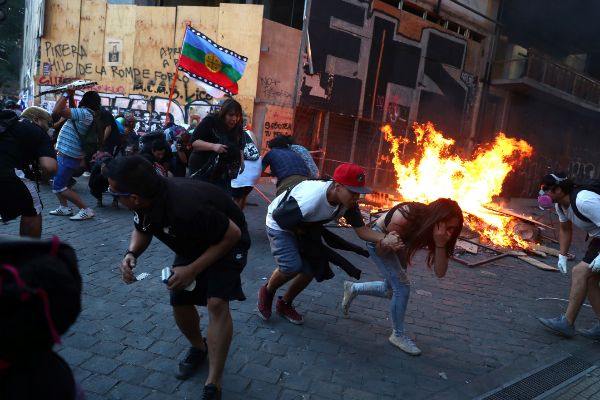- Protests.Chile burns again on the first day without a state of emergency
- Protests: From Chile to Iraq: the new foci of global discontent
Chile lived today one of the most complex days since the beginning of the social outbreak almost a month ago. The general strike called for Tuesday included incidents, looting and fires in different regions of the country, as well as a new death to increase the list to 24 deaths in less than four weeks. The peso underwent a strong devaluation, the ghost of a slowdown in the economy was strongly installed and the relationship between government and opposition tensed in the face of the sanction of a new National Constitution.
"We call to totally paralyze the productive tasks and jobs", affirms a call of the so-called "Social Board", which brings together a good part of the social organizations of the country, including the National Association of Fiscal Employees (Anef), the College of Teachers, public health workers, port and airport employees. Although the National Copper Confederation, which brings together mining workers, joined the strike, the state-owned Codelco, the world's largest copper producer, operated normally.
Sebastián Piñera's government is under pressure from the right and the left. "The extreme violence and looting of today, together with attacks on police and armed forces, imply an absolute setback in control of public order and threaten millions of Chileans," said ultra-rightist Jose Antonio Kast. "Unfortunately, it is essential to declare a state of emergency and start defending the majority of Chileans."
In Calama, in the north of the country, a young man was hit and killed by the driver of a truck that panicked in the middle of a demonstration.
While the strike was taking place, stock traders and investors in Sanhattan, Santiago's financial center, watched with astonishment the indexes that returned their screens: the dollar was quoted at 787 Chilean pesos, a devaluation of almost five percent compared to Monday . The Chilean currency has been falling to lows that were unknown in two decades. The Chilean GDP, which has been growing steadily for twenty years, could contract in the current month, a group of experts called by the Santiago Chamber of Commerce estimated today . What may happen in 2020 is uncertain, they added.
According to El Mercurio, the explosive social situation generated a crisis that "hits tourism", with a "high number of hotel cancellations", a "dramatic" situation for retail trade and an inevitable rise in unemployment. The Santiago Chamber of Commerce estimated that since the social outbreak, sales have fallen by 50 percent on average. The cancellation of two international summits, that of the APEC and that of the Climate, in addition to the final of the Copa Libertadores, seriously affected the economy of the country. The government has already estimated a fall in GDP of up to 0.5 percent for October.
Javier Hurtado, Studies Manager of the Chilean Chamber of Construction (CChC), made an estimate of the cost of the Chilean social outbreak so far: "If one analyzes all the destruction of public infrastructure there are 2,329 million dollars between subway, sidewalks and streets in the cities of Santiago, Valparaíso and Concepción and 2,250 million in non-residential buildings. That gives at least 4,579 million real physical damages to date. It is about 15 percent of what was the damage caused. " by the earthquake of February 27, 2010, the eighth most powerful recorded in the world, which took 525 lives.
The state of social insurrection that Chile is going through began almost four weeks ago, when a protest by students for a rise in the Santiago metro ticket grew to unexpected levels. A good part of the Chilean capital's metro network was rendered useless, President Sebastián Piñera reacted by giving the military control of security and imposing the state of siege and 1.2 million people demonstrated asking for a change.
The balance so far is 24 dead, thousands injured and 201 people who lost all or part of an eye due to the pellets used by the police, the militarized police in the country. There are, in addition, a large number of complaints of human rights violations, from physical abuse to sexual abuse, to assassinations awarded to security forces.
In that context, Piñera agreed this week to a transversal claim in society, the sanction of a new Constitution to replace that of 1980, during the dictatorship of Augusto Pinochet. But by opening that possibility, Piñera unleashed even greater forces: the government does not want a Constituent Assembly, but the entire opposition agreed today that this is the way.
"All opposition parties agree that a new Constitution must be drafted in full by an institutional body one hundred percent elected for that sole purpose. Two thirds of the votes in the current Congress are required. The government has the floor "said Deputy Gabriel Boric.
According to the criteria of The Trust Project
Know more- Chile
- Sebastian Piñera
- GDP
- Unemployment
Chile Second day of a general strike in Chile: "We have young people with a rifle in their hands"
ChileNight of chaos, violence and death in a convulsed Chile
Wide AngleA balance of blocks in Latin America

